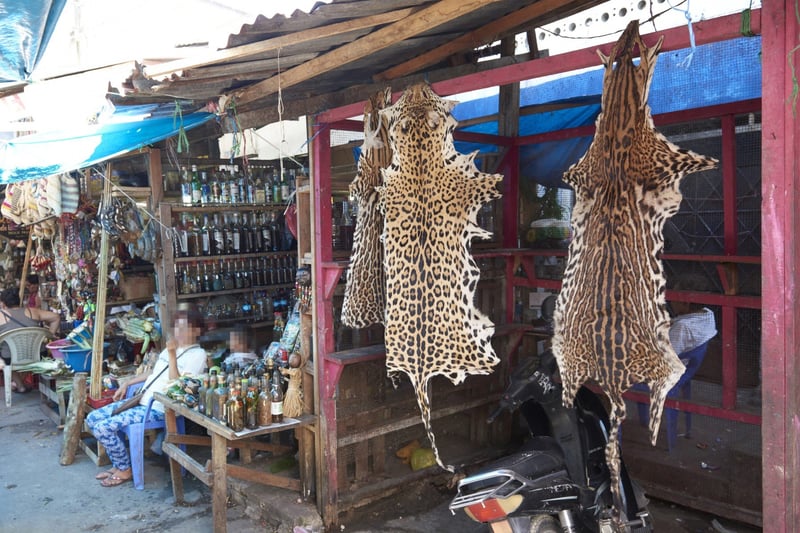
Peru market investigation reveals wild animals sold illegally
News
More than 200 species of wild animals sourced from the Amazon rainforest are being illegally sold in shocking conditions at urban markets in Iquitos, Peru.
Image by: Fernando Carniel Machado
The World Animal Protection investigation identified serious concerns for animal welfare, species’ conservation and the health of communities that rely on this market for their living.
Our new report ‘Risky business: How Peru’s wildlife markets are putting animals and people at risk’ puts the Belén market in the spotlight, where wild mammals, reptiles and birds are being sold both live and dead as derivatives, with some animals being slaughtered on site.
WARNING: Video contains some graphic imagery
Wildlife market cruelty
Wild animals such as jaguars, primates, sloths, river dolphins, manatees, turtles, macaws, snakes, and capybaras were all found on sale at the market, some were alive and kept in dire conditions. The animals are mostly sold as wild meat, but also as luxury pets and for spiritual, medicinal and decorative use.
While animals such as caimans and turtles were mainly being sold as wild meat, other animals were reportedly sold for more unusual, belief-based uses such as:
- Dolphin’s genitalia and eyes were sold as ingredients to create an aphrodisiacal perfume called “pusanga” which is thought to bring luck or ensure seduction;
- sloth claws and the dried heads of yellow-footed tortoises were sold to ‘tame jealous men,’ and to ‘prevent a violent jealous reaction’;
- tapir (large, herbivorous mammals) nails were sold to treat hemorrhages, and;
- armadillo tails were sold for inner ear pain.
The Belén market, which is considered the largest open-air market selling wildlife in the Peruvian Amazon, has few to no health and safety measures in place to prevent zoonotic diseases from spreading from wildlife to people. This poses a huge health risk to people as wild animals are known to transmit deadly diseases to humans, such as COVID-19, SARS (severe acute respiratory syndrome) and Ebola.
Gilbert Sape, Head of Animals in the Wild, at World Animal Protection, said:
This market is taking a deadly gamble with people’s heath. Live animals cramped in dirty cages where their immune systems are compromised, and untreated animal carcasses, pose a serious health risk. Markets like these acts as a petri dish for diseases to develop. We must remember the lessons of the past and how many zoonotic diseases originated from this type of wild animal exploitation. COVID-19 is an obvious and present example, which continues to destroy lives each day.
The wild animals found here would have suffered heart-wrenching cruelty – from being snatched from the wild, to their brutal slaughter or lifetime imprisonment in a cage. For these wild animals, there are no happy endings, alongside many of their populations rapidly plummeting in the wild. We must act now to save these incredible animals that belong in the Amazon rainforest.
The commercial trade in wild animals at urban markets, such as Belén market, is illegal in Peru [1]. However, illegal wildlife trade activity is an on-going issue. The Peruvian police authorities have attempted to clamp down on this type of activity, although officials interviewed as part of the investigation stated that it is challenging to monitor as wildlife vendors are constantly moving without fixed stalls, and operate on an opportunistic basis.
The United Nations Development Programme (UNDP) has been working with local authorities to improve the safety of the Belén market since 2015 [2] [3], and the market has only recently re-opened as the area comes out of lockdown. The findings in this report highlight that more work is needed to ensure the safety of this market, due to the risk that zoonotic diseases pose to human health, and so far, little progress has been made despite the pandemic and warnings from the United Nations and World Health Organization respectively.
How you can help
World Animal Protection is calling on the Peruvian government to ask local authorities to step up efforts to eliminate the trade of wildlife for human consumption. This would be through increased support from national, regional, and international levels to ensure that public awareness, enforcement, rescue and rehabilitation, and businesses, are supported, as well as providing alternative livelihoods to those involved in the trade.
Last year, over a million people joined us and signed our petition calling on the G20 to end the global wildlife trade, forever.
You can help by demanding G20 leaders demonstrate political will by committing to end the global wildlife trade to prevent the next pandemic – watch out for more actions as we ready for G20 2021 in Rome, Italy.
[1] (Law No 29763).
[3] UNDP (2020). Documento de Proyecto entre el Ministerio de la Producción y el Programa de las Naciones Unidas para el Desarrollo. https://cdn.www.gob.pe/uploads/document/file/1537968/CONVENIO.pdf.pdf
For these wild animals, there are no happy endings, alongside many of their populations rapidly plummeting in the wild. We must act now to save these incredible animals that belong in the Amazon rainforest.